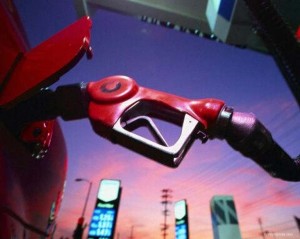If your wallet is still hurting from the painfully high fuel prices much of the country experienced over the winter there’s some good news next time you head to the pump.
The average price of a gallon of regular unleaded gas has dipped to just $3.58, a three-cent dip since late last week, 15 cents from a month ago, and 36 cents off of what the typical American motorist was spending this time in 2012. That’s a sharp turnaround from February when some states saw gas surge to near or all-time records, particularly along the West Coast.
Buyers are still paying an average $4.359 in Hawaii and $4.027 in Washington, D.C., but California is back under the $4.00 mark, at $3.998, according to GasBuddy.com, a well-respected fuel price tracking service. And it’s down to $3.286 in Montana – where motorists are paying just $3.261 in Billings. Some reports indicate that the price has dropped below the $3.00 mark in a few Rocky Mountain communities near to major refineries.
And GasBuddy is forecasting still “more markets” will dip under that break point in the coming days.
While crude prices posted some gains in early Monday trading, petroleum futures have been in sharp decline for several weeks. One key reason, reports the federal Energy Information Administration is that the country’s inventories are now at a 22-year peak.
The U.S. has been rapidly ramping up oil production for several years and is expected to actually be a larger producer than Saudi Arabia and other OPEC providers by mid-decade. That doesn’t necessarily translate into lower prices, as petroleum is traded as a global commodity. But despite concerns about Mideast instability – notably reductions in production in war-torn Syria – there appears to be a good supply, if not a glut of the black gold now available around the world.
According to Tom Kloza, chief analyst with the Oil Price Information Service, only a major “disruption in the Mideast” would likely provoke a sharp spike in fuel prices around the world.
That said, analysts warn that Americans can’t be complacent. Traders continue trying to push up the price of crude. And as U.S. motorists have been seeing, regional spikes are becoming more common. That can follow the changeover from summer to winter fuel blends designed to reduce regional air pollution problems. It can also result from maintenance and other issues, such as those that affected large swaths of the Midwest and Pacific Coast over the last year.
Even in areas where prices top the national charts today, the figures are significantly down from year-ago levels – when California stood at $4.28 a gallon, for example.
The sudden decline in gas prices may be fueling a shift in the U.S. new car market, meanwhile. Sales of pickups, in particular, surged during March and light trucks outsold passenger cars on the whole, despite recent trends moving in the opposite direction.


It’s amazing what over-production of fuel and lowered consumption can do. Just think if those 30 million people who use to have jobs, still had jobs, fuel consumption might increase.